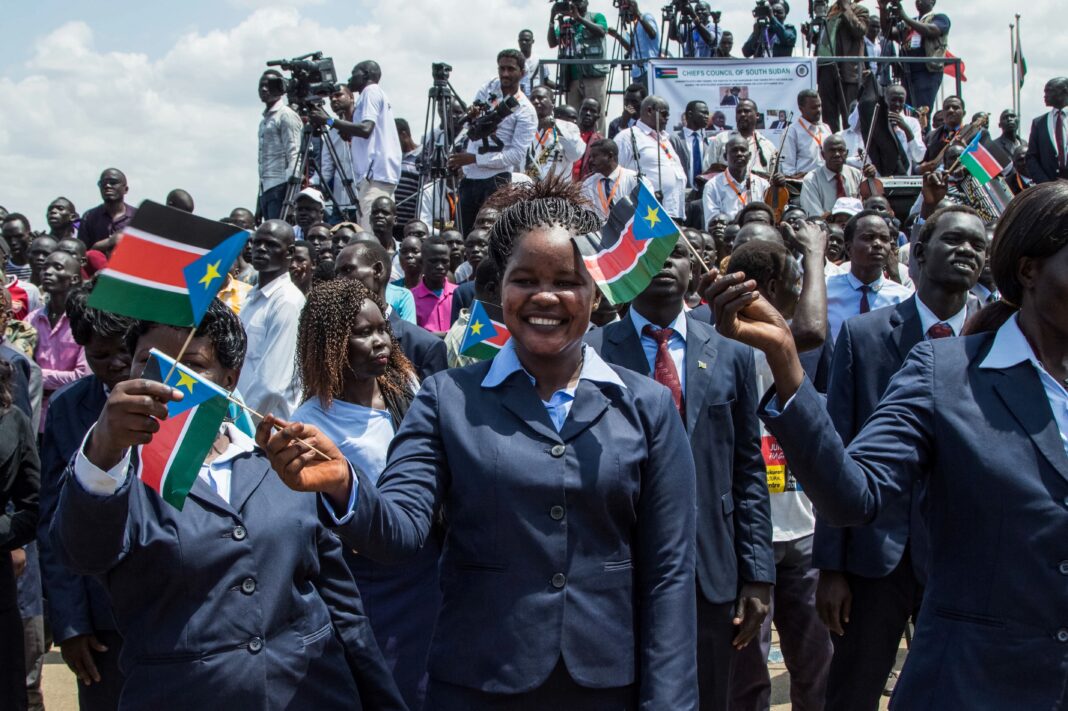By Vincent Samuel,
Juba, 16 May 2024—South Sudanese expressed mixed reactions to the ongoing peace talks between the transitional government of national unity and the holdout groups known as SSOMA (South Sudan Opposition Movements Alliance) that abstained from signing the 2018 peace pact.
Last week, the peace talks were launched and attended by several heads of state of the East African Community, South Sudan’s unity government negotiators, and SSOMA, civil society leaders among others in Nairobi, Kenya. This followed a request by President Kiir for Kenya to play a mediation role as it did for the 2005 Comprehensive Peace Agreement (CPA).
Malawi’s President Lazarus Chakwera, Zambia’s Hakainde Hichilema, Namibia’s Nangolo Mbumba, and Central African Republic’s Faustin-Archange Touadera also attended the meeting that took place after an African Union agricultural summit earlier in the day.
Speaking during the launching of this new round of peace talks dubbed “Tumaini”, meaning hope in Swahili, President Salva Kiir Mayardit applauded his Kenyan counterpart, William Ruto, for mediating and hosting the talks.
President Kiir affirmed that his government would negotiate in good faith and with an open mind. He hoped his rivaling groups (SSOMA) share a similar conviction and desire for peace in South Sudan.
In Juba, the national capital of the Republic of South Sudan, the common populace received the news with mixed reactions as some residents wondered why the peace process was relocated to Kenya instead of Rome, a neutral country.
Vincent Samuel, a Golden Times reporter in Juba encountered with some South Sudanese residents in the streets of Juba on Thursday, 16 May 2024 on the eve of SPLA (Sudan People’s Liberation Army) liberation struggle day.
Khamis Alexander, a resident of Munuki residential area doubts Kenya’s role as a mediator, saying the Kenyan government has been meddling in South Sudan’s internal affairs since 2013 to date.
“Kenya as a mediator, this is a joke. First of all, Kenya is a neighboring country and it has interest in the ongoing conflict in South Sudan. Why did they in the first play move the peace talks from Rome to Nairobi? I doubt whether this thing can bear any fruit. If they cannot listen to Pope Francis, will they listen to William Ruto,” Alexander said.
The 28 years old resident of Munuki, Yuggu Elikai Tombe, commended the government and the holdout groups for choosing dialogue to iron out their political differences.
He urged the government and the SSOMA to leave behind their individual interests and reach a breakthrough before the December general elections.
“It is always good to dialogue with open heart and mind. The government and opposition groups have chosen a good thing. The people of South Sudan are tired fighting senseless wars which claim lives and destroy property,” Tombe said.
Another resident of Miya Sabba residential area, Amer Deng Makoi said many South Sudanese find it easy to climb to power through forming a rebellion against the government and causing havocs in the country.
“The government should do everything possible to uphold accountability for atrocities committed against the citizens by some of those now negotiating in Nairobi. Some of them killed many people before they are offered a chance to negotiate with the government. Soon, they will be given senior positions in the government. What about the people they killed? The government should discourage offering positions to warlords,” Ms. Makoi said.
A resident of Juba who preferred not to be mentioned in this article wondered what moral duty does Kenya have to mediate the South Sudan’s peace process.
He alleged that, in 2017, Kenya assisted the South Sudan’s security agents to deport the political critics like Aggrey Ezbon and Samuel Dong Luak, to Juba where they were killed in cold blood.
“What moral duty does Kenya have to mediate the South Sudan’s peace talks? Wasn’t this same Kenya that deported Aggrey and Samuel to Juba and late they got killed by the National Security? A country like this cannot host South Sudan’s peace talks because it has already compromised its neutrality. I am afraid, if this peace talks collapse, some of these politicians are going to be deported to Juba. You just mark my word and prove me wrong later,” he stressed.
Yesterday, Wednesday, 15 May; the Kenya’s Special Envoy Charles Keter briefed President Kiir on the progress of the ongoing peace process.
Keter assured the people of South Sudan that Kenya will play a neutral role in the search for lasting peace in South Sudan.
Information Minister, Michael Makuei Lueth, in another development reasserted the government’s unwavering dedication to inclusive negotiation process to restore durable peace, stability, and economic development in the country.
The Chairperson of Real SPLM, Pagan Amum Okech said the historical task was to lay the foundation of the new nation after independence [in 2011] and to achieve that, the parties have to engage in dialogue.
“We have to be positive, and have to overcome this hatred that has filled our hearts. What we need is not another peace agreement. Peace agreements are not being implemented; what we need is a serious dialogue, a real soul search so that we can really address the root causes [of the conflict] and come out with a new social contract that will define what type of state we want to have […] that will define what type of [a] nation we are and how do we manage our affairs,” Pagan stated this in Nairobi while addressing the peace mediation process.
The launch of the High-Level Mediation for South Sudan in Nairobi, Kenya marks a significant step in laying the foundation towards achieving enduring peace and stability in the country, the Interim Chairperson of the Reconstituted Joint Monitoring and Evaluation Commission (RJMEC), Charles Tai Gituai said.
“This bold and decisive step taken towards creating an opportunity for the Government, the Holdout groups and the people of the Republic of South Sudan to dialogue and chart the way forward in a peaceful manner for their country, is commendable,” Gituai added.
Charles Tai Gituai said the talks should create a momentum for achieving inclusivity, build on tolerance, reconciliation and forgiveness; recognising that having peace, justice and strong institutions in a country promote stability fairness and accountability, leading to sustainable development and a better quality of life for all citizens.




